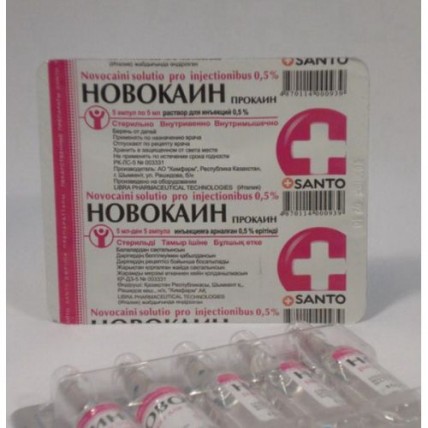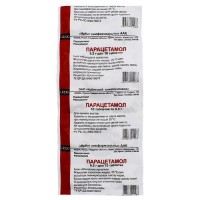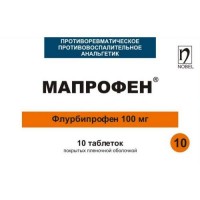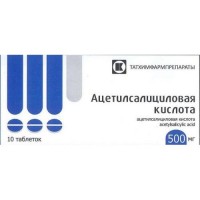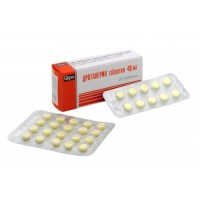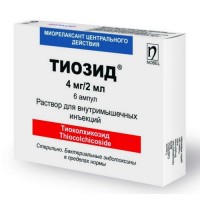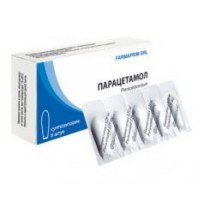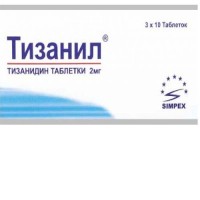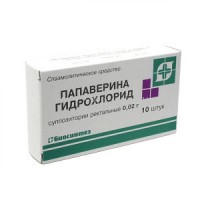Novocaine 0,5% / 5 ml 5's solution for injection in ampoules
- $5.00
The instruction for medical use
of medicine
Novocaine
the Trade name
Novocaine
the International unlicensed
name Procainum Dosage Form Solution for injections of 0.5% 2 ml, 5 ml, 2% 2 ml
Structure
of 1 ml of drug contains
active agent - Procainum a hydrochloride of 5.0 mg or 20.0 mg,
excipients: solution of 0.1 M of acid chlorohydrogen, water for injections.
Description
Transparent, colourless or slightly yellowish liquid.
Pharmacotherapeutic group
Anesthetics. Local anesthetics. Aminobenzoic acid ethers. Procainum
the ATX N01BA02 Code
the Pharmacological
Pharmacokinetics Procainum properties is exposed to full system absorption which extent depends on the place, a way of introduction (especially on vascularization and the speed of a blood-groove in the field of introduction) and drug doses (quantities and concentration).
It is quickly hydrolyzed by esterases of blood plasma and a liver with education of two main pharmacological active metabolites: diethylaminoethanol (possesses moderate vasodilating action) and para-aminobenzoic acid.
The period of semi-elimination (T1/2) is 40.0±9.0 sec. It is removed mainly by kidneys in the form of metabolites, in not changed look no more than 2% are removed.
A pharmacodynamics
Mestnoanesteziruyushchy means with the moderate anesthetizing activity
and big width of therapeutic action. Being the weak basis,
blocks Na + channels, interferes with generation of impulses in the terminations of sensory nerves and to carrying out impulses on nerve fibrils. Changes action potential in membranes of neurons without the significant influence on rest potential. Suppresses carrying out not only painful, but also impulses of other modality. Has the short anesthetizing activity (duration of infiltration anesthesia is 0.5-1 h).
At absorption and direct intravascular introduction reduces excitability of peripheral cholinergic receptors, reduces education and release of acetylcholine from the preganglionic terminations (possesses some ganglioblokiruyushchy action), eliminates a spasm of smooth muscles, reduces excitability of a myocardium and motor zones of a cerebral cortex. At intravenous administration has analgeziruyushchy, hypotensive and antiarrhytmic effect (increases the effective refractory period, reduces excitability, automatism and conductivity), in high doses can break neuromuscular conductivity. Eliminates the descending brake influences of a reticular formation of a brainstem and polisinaptichesky reflexes.
Indications
- for local anesthesia (infiltration, conduction, peridural,
epidural, spinal - subarachnoidal, intra bone)
- for carrying out blockade (vagosympathetic and perinephric blockade,
juxtaspinal blockade in eczemas, neurodermatitis, an ischialgia)
the Route of administration and doses
the Dose and concentration of solution of Novocaine depend on the nature of surgery, a route of administration, a state and age of the patient,
use Drug vnutrikozhno, intramusculary, intravenously.
For local anesthesia
For infiltration anesthesia apply 0.25% - 0.5% solutions (no more than 1 g to single introduction), to anesthesia by a method of hard creeping infiltration of fabrics (according to A.V. Vishnevsky) - 0.125% - 0.25% solutions, for conduction, Epi - and peridural anestezy – 2% solution of 20-25 ml, to spinal anesthesia – 2% solution of 5 ml.
For infiltration anesthesia the following maximum doses are established (for adults): the first single dose at the beginning of operation – not over 1.25 g (500 ml of 0.25% of solution) or 0.75 g (150 ml of 0.5% of solution). Further for each hour of operation – not over 2.5 g (1000 ml of 0.25% of solution) or 2 g (400 ml of 0.5% of solution) (up to 0.5 g once without adrenaline and 1 g with adrenaline).
For reduction of absorption and lengthening of action Novocaine is used together with 0.1% solution of adrenaline which is added aseptically at the rate of 1 drop on 2-5 ml of solution of Novocaine.
Use of drug at intra bone anesthesia is possible - 0.25% solution of 50-150 ml.
For carrying out blockade
At juxtaspinal blockade in eczemas and neurodermatitis intracutaneous injections of 0.25% 70-100 ml of solution of Novocaine in a zone of a projection of sensitive nervous trunks are recommended.
At perinephric blockade (according to A.V. Vishnevsky) enter 50-80 ml of 0.5% of solution or 100-150 ml of 0.25% of solution of Novocaine into pararenal cellulose.
At vagosympathetic blockade - 30-100 ml of 0.5% of solution of Novocaine.
The maximum doses of Novocaine (for adults): at intramuscular introduction a single dose - 0.1 g, at intravenous administration a single dose - 0.05 g, the daily dose at parenteral administration makes 0.1 g.
In need of use of lower concentration of Novocaine (0.125% or 0.25%), drug before use is dissolved with sterile isotonic solution of sodium of chloride to the required concentration.
Intravenous administration is carried out slowly, in isotonic solution of sodium of chloride.
Doses in pediatric practice are defined depending on body weight, but no more than 15 mg/kg of body weight.
Side effects
- a headache, dizziness, weakness, drowsiness
- nausea, vomiting
- arterial hypotension, collapse, bradycardia, thorax pain
- visual and acoustical disturbances, a nystagmus
- a tremor, spasms
- a methemoglobinemia
- allergic reactions (dermatitis, urticaria, a skin itching, an erythema,
a Quincke's disease, an acute anaphylaxis)
of the Contraindication
- hypersensitivity to Procainum and components of drug
- the significant fibrous changes in fabrics (for anesthesia by method
of creeping infiltrate)
- purulent process in the injection site
- the immediate surgeries which are followed by sharp blood loss
- a myasthenia
- arterial hypotension
- children's age up to 12 years
Medicinal interactions
At intravenous administration Novocaine strengthens the oppressing action on the central nervous system of means for the general anesthesia, hypnotic drugs, sedative drugs, narcotic analgetics and tranquilizers.
When prescribing drug together with narcotic analgetics the additive effect is noted that is used when carrying out spinal and epidural anesthesia, at the same time respiratory depression amplifies.
Vasoconstrictors (epinephrine, metoksamin, Phenylephrinum) extend mestnoanesteziruyushchy effect of Novocaine.
Drug prolongs the neuromuscular blockade caused by succinylcholine as both drugs are hydrolyzed by plasma cholinesterase.
Novocaine strengthens and extends effect of myorelaxation medicines.
Novocaine reduces anti-myasthenic effect of medicines, especially at its use in high doses that demands additional correction of treatment of a myasthenia.
Cholinesterase inhibitors (anti-myasthenic medicines, cyclophosphamide, demekarin, ecothioveils, Thiotepum) reduce Novocaine metabolism therefore their joint appointment is not recommended.
Anticoagulants (ardeparin, dalteparin, danaparoid, enoksaparin, heparin, warfarin) at combined use with Novocaine increase risk of developing bleedings.
Use with MAO inhibitors (furasolidone, Procarbazinum, selegilin) increases risk of developing hypotension therefore they should be cancelled in 10 days prior to local anesthetic.
When using Novocaine with guanadrely, guanetidiny, mekamilaminy, trimetafany the risk of a sharp lowering of arterial pressure and bradycardia increases.
The Novocaine metabolite para-aminobenzoic acid is a competitive antagonist of streptocides and can weaken their antimicrobial action therefore simultaneous use of these drugs is not recommended.
When processing the place of an injection of Novocaine the disinfecting solutions containing heavy metals risk of development of local reaction in the form of morbidity and hypostasis increases.
Special instructions
Novokain is usually well had, however he can cause by-effects and at all methods of administration it should be applied with care. The profound hypotension demanding purpose of sympathomimetics is sometimes noted.
Drug is used with care at the immediate surgeries complicated by sharp blood loss, the states which are followed by decrease in a hepatic blood-groove, progressing of cardiovascular insufficiency, inflammatory diseases or infection of the place of an injection, deficiency of pseudo-cholinesterase, a renal failure at elderly patients 65 years are more senior, than the seriously ill patients weakened patients.
When carrying out anesthesia it is necessary to exercise control
of the vital functions of an organism.
Before use of anesthetic conducting tests on
individual sensitivity to drug is obligatory.
When carrying out local anesthesia at use of the same general dose the toxicity of Novocaine of subjects is higher, than the applied solution is more concentrated.
Drug is not soaked up from mucous membranes, therefore
does not provide surface anesthesia at skin use.
The period of pregnancy and a lactation
during pregnancy and a lactation it is necessary to use drug with extra care, according to absolute indications.
Features of influence of medicine on ability to run the vehicle or potentially dangerous mechanisms
Considering side effects of medicine, it is necessary to be careful when driving or potentially dangerous mechanisms
Overdose
Symptoms: pallor of integuments, dizziness, nausea, vomiting, "cold" sweat, excitement or oppression of central nervous system, illegibility of visual perception, tremor, spasms, respiratory depression, bradycardia, decrease in warm emission, collapse, coma.
Treatment: maintenance of lung ventilation, disintoxication and symptomatic therapy.
A form of release and packing
of 0.5% solution on 2 ml No. 5 or No. 10, 2% solution on 2 ml No. 5 or No. 10 in ampoules of neutral glass for spray filling or an ampoule sterile for spray filling import, with a point of a break or a ring of a break.
0.5 solution % on 5 ml No. 5 in ampoules of neutral glass or in ampoules of neutral glass for spray filling or an ampoule sterile for spray filling import, with a point of a break or a ring of a break.
On each ampoule paste the label from paper label or writing.
0.5% solution on 2 ml on 5 or 10 ampoules, or on 5 ml on 5 ampoules pack into blister strip packaging from a film polyvinylchloride and a foil aluminum or import.
2% pack solution on 2 ml on 5 or 10 ampoules into blister strip packaging from a film polyvinylchloride and a foil aluminum or import.
Planimetric packings together with the approved iinstruktion on medical use in the state and Russian languages place in boxes of cardboard or corrugated fibreboard. The number of instructions for medical use invests on number of packs.
To Store storage conditions in the place protected from light, at a temperature not over 250C.
To store out of children's reach!
3 years
not to use a period of storage after an expiration date.
Prescription status
According to the prescription
JSC Khimfarm Producer,
Republic of Kazakhstan, Shymkent, Rashidov St., 81
the Owner of the registration certificate
of JSC Khimfarm, the Republic of Kazakhstan
the Address of the organization accepting in the territory of the Republic of Kazakhstan claims from consumers on quality of products (goods)
of JSC Khimfarm,
Republic of Kazakhstan, Shymkent, Rashidov St., 81 Phone number 7252 (561342)
Fax number 7252 (561342)
To develop the E-mail address of infomed@santo.kz
of medicine
Novocaine
the Trade name
Novocaine
the International unlicensed
name Procainum Dosage Form Solution for injections of 0.5% 2 ml, 5 ml, 2% 2 ml
Structure
of 1 ml of drug contains
active agent - Procainum a hydrochloride of 5.0 mg or 20.0 mg,
excipients: solution of 0.1 M of acid chlorohydrogen, water for injections.
Description
Transparent, colourless or slightly yellowish liquid.
Pharmacotherapeutic group
Anesthetics. Local anesthetics. Aminobenzoic acid ethers. Procainum
the ATX N01BA02 Code
the Pharmacological
Pharmacokinetics Procainum properties is exposed to full system absorption which extent depends on the place, a way of introduction (especially on vascularization and the speed of a blood-groove in the field of introduction) and drug doses (quantities and concentration).
It is quickly hydrolyzed by esterases of blood plasma and a liver with education of two main pharmacological active metabolites: diethylaminoethanol (possesses moderate vasodilating action) and para-aminobenzoic acid.
The period of semi-elimination (T1/2) is 40.0±9.0 sec. It is removed mainly by kidneys in the form of metabolites, in not changed look no more than 2% are removed.
A pharmacodynamics
Mestnoanesteziruyushchy means with the moderate anesthetizing activity
and big width of therapeutic action. Being the weak basis,
blocks Na + channels, interferes with generation of impulses in the terminations of sensory nerves and to carrying out impulses on nerve fibrils. Changes action potential in membranes of neurons without the significant influence on rest potential. Suppresses carrying out not only painful, but also impulses of other modality. Has the short anesthetizing activity (duration of infiltration anesthesia is 0.5-1 h).
At absorption and direct intravascular introduction reduces excitability of peripheral cholinergic receptors, reduces education and release of acetylcholine from the preganglionic terminations (possesses some ganglioblokiruyushchy action), eliminates a spasm of smooth muscles, reduces excitability of a myocardium and motor zones of a cerebral cortex. At intravenous administration has analgeziruyushchy, hypotensive and antiarrhytmic effect (increases the effective refractory period, reduces excitability, automatism and conductivity), in high doses can break neuromuscular conductivity. Eliminates the descending brake influences of a reticular formation of a brainstem and polisinaptichesky reflexes.
Indications
- for local anesthesia (infiltration, conduction, peridural,
epidural, spinal - subarachnoidal, intra bone)
- for carrying out blockade (vagosympathetic and perinephric blockade,
juxtaspinal blockade in eczemas, neurodermatitis, an ischialgia)
the Route of administration and doses
the Dose and concentration of solution of Novocaine depend on the nature of surgery, a route of administration, a state and age of the patient,
use Drug vnutrikozhno, intramusculary, intravenously.
For local anesthesia
For infiltration anesthesia apply 0.25% - 0.5% solutions (no more than 1 g to single introduction), to anesthesia by a method of hard creeping infiltration of fabrics (according to A.V. Vishnevsky) - 0.125% - 0.25% solutions, for conduction, Epi - and peridural anestezy – 2% solution of 20-25 ml, to spinal anesthesia – 2% solution of 5 ml.
For infiltration anesthesia the following maximum doses are established (for adults): the first single dose at the beginning of operation – not over 1.25 g (500 ml of 0.25% of solution) or 0.75 g (150 ml of 0.5% of solution). Further for each hour of operation – not over 2.5 g (1000 ml of 0.25% of solution) or 2 g (400 ml of 0.5% of solution) (up to 0.5 g once without adrenaline and 1 g with adrenaline).
For reduction of absorption and lengthening of action Novocaine is used together with 0.1% solution of adrenaline which is added aseptically at the rate of 1 drop on 2-5 ml of solution of Novocaine.
Use of drug at intra bone anesthesia is possible - 0.25% solution of 50-150 ml.
For carrying out blockade
At juxtaspinal blockade in eczemas and neurodermatitis intracutaneous injections of 0.25% 70-100 ml of solution of Novocaine in a zone of a projection of sensitive nervous trunks are recommended.
At perinephric blockade (according to A.V. Vishnevsky) enter 50-80 ml of 0.5% of solution or 100-150 ml of 0.25% of solution of Novocaine into pararenal cellulose.
At vagosympathetic blockade - 30-100 ml of 0.5% of solution of Novocaine.
The maximum doses of Novocaine (for adults): at intramuscular introduction a single dose - 0.1 g, at intravenous administration a single dose - 0.05 g, the daily dose at parenteral administration makes 0.1 g.
In need of use of lower concentration of Novocaine (0.125% or 0.25%), drug before use is dissolved with sterile isotonic solution of sodium of chloride to the required concentration.
Intravenous administration is carried out slowly, in isotonic solution of sodium of chloride.
Doses in pediatric practice are defined depending on body weight, but no more than 15 mg/kg of body weight.
Side effects
- a headache, dizziness, weakness, drowsiness
- nausea, vomiting
- arterial hypotension, collapse, bradycardia, thorax pain
- visual and acoustical disturbances, a nystagmus
- a tremor, spasms
- a methemoglobinemia
- allergic reactions (dermatitis, urticaria, a skin itching, an erythema,
a Quincke's disease, an acute anaphylaxis)
of the Contraindication
- hypersensitivity to Procainum and components of drug
- the significant fibrous changes in fabrics (for anesthesia by method
of creeping infiltrate)
- purulent process in the injection site
- the immediate surgeries which are followed by sharp blood loss
- a myasthenia
- arterial hypotension
- children's age up to 12 years
Medicinal interactions
At intravenous administration Novocaine strengthens the oppressing action on the central nervous system of means for the general anesthesia, hypnotic drugs, sedative drugs, narcotic analgetics and tranquilizers.
When prescribing drug together with narcotic analgetics the additive effect is noted that is used when carrying out spinal and epidural anesthesia, at the same time respiratory depression amplifies.
Vasoconstrictors (epinephrine, metoksamin, Phenylephrinum) extend mestnoanesteziruyushchy effect of Novocaine.
Drug prolongs the neuromuscular blockade caused by succinylcholine as both drugs are hydrolyzed by plasma cholinesterase.
Novocaine strengthens and extends effect of myorelaxation medicines.
Novocaine reduces anti-myasthenic effect of medicines, especially at its use in high doses that demands additional correction of treatment of a myasthenia.
Cholinesterase inhibitors (anti-myasthenic medicines, cyclophosphamide, demekarin, ecothioveils, Thiotepum) reduce Novocaine metabolism therefore their joint appointment is not recommended.
Anticoagulants (ardeparin, dalteparin, danaparoid, enoksaparin, heparin, warfarin) at combined use with Novocaine increase risk of developing bleedings.
Use with MAO inhibitors (furasolidone, Procarbazinum, selegilin) increases risk of developing hypotension therefore they should be cancelled in 10 days prior to local anesthetic.
When using Novocaine with guanadrely, guanetidiny, mekamilaminy, trimetafany the risk of a sharp lowering of arterial pressure and bradycardia increases.
The Novocaine metabolite para-aminobenzoic acid is a competitive antagonist of streptocides and can weaken their antimicrobial action therefore simultaneous use of these drugs is not recommended.
When processing the place of an injection of Novocaine the disinfecting solutions containing heavy metals risk of development of local reaction in the form of morbidity and hypostasis increases.
Special instructions
Novokain is usually well had, however he can cause by-effects and at all methods of administration it should be applied with care. The profound hypotension demanding purpose of sympathomimetics is sometimes noted.
Drug is used with care at the immediate surgeries complicated by sharp blood loss, the states which are followed by decrease in a hepatic blood-groove, progressing of cardiovascular insufficiency, inflammatory diseases or infection of the place of an injection, deficiency of pseudo-cholinesterase, a renal failure at elderly patients 65 years are more senior, than the seriously ill patients weakened patients.
When carrying out anesthesia it is necessary to exercise control
of the vital functions of an organism.
Before use of anesthetic conducting tests on
individual sensitivity to drug is obligatory.
When carrying out local anesthesia at use of the same general dose the toxicity of Novocaine of subjects is higher, than the applied solution is more concentrated.
Drug is not soaked up from mucous membranes, therefore
does not provide surface anesthesia at skin use.
The period of pregnancy and a lactation
during pregnancy and a lactation it is necessary to use drug with extra care, according to absolute indications.
Features of influence of medicine on ability to run the vehicle or potentially dangerous mechanisms
Considering side effects of medicine, it is necessary to be careful when driving or potentially dangerous mechanisms
Overdose
Symptoms: pallor of integuments, dizziness, nausea, vomiting, "cold" sweat, excitement or oppression of central nervous system, illegibility of visual perception, tremor, spasms, respiratory depression, bradycardia, decrease in warm emission, collapse, coma.
Treatment: maintenance of lung ventilation, disintoxication and symptomatic therapy.
A form of release and packing
of 0.5% solution on 2 ml No. 5 or No. 10, 2% solution on 2 ml No. 5 or No. 10 in ampoules of neutral glass for spray filling or an ampoule sterile for spray filling import, with a point of a break or a ring of a break.
0.5 solution % on 5 ml No. 5 in ampoules of neutral glass or in ampoules of neutral glass for spray filling or an ampoule sterile for spray filling import, with a point of a break or a ring of a break.
On each ampoule paste the label from paper label or writing.
0.5% solution on 2 ml on 5 or 10 ampoules, or on 5 ml on 5 ampoules pack into blister strip packaging from a film polyvinylchloride and a foil aluminum or import.
2% pack solution on 2 ml on 5 or 10 ampoules into blister strip packaging from a film polyvinylchloride and a foil aluminum or import.
Planimetric packings together with the approved iinstruktion on medical use in the state and Russian languages place in boxes of cardboard or corrugated fibreboard. The number of instructions for medical use invests on number of packs.
To Store storage conditions in the place protected from light, at a temperature not over 250C.
To store out of children's reach!
3 years
not to use a period of storage after an expiration date.
Prescription status
According to the prescription
JSC Khimfarm Producer,
Republic of Kazakhstan, Shymkent, Rashidov St., 81
the Owner of the registration certificate
of JSC Khimfarm, the Republic of Kazakhstan
the Address of the organization accepting in the territory of the Republic of Kazakhstan claims from consumers on quality of products (goods)
of JSC Khimfarm,
Republic of Kazakhstan, Shymkent, Rashidov St., 81 Phone number 7252 (561342)
Fax number 7252 (561342)
To develop the E-mail address of infomed@santo.kz
